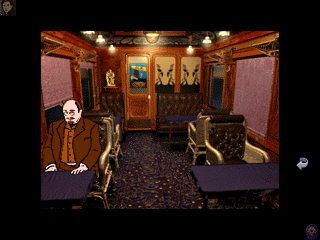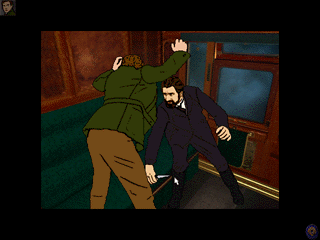

A clue in every car.
A stranger in every seat.
Danger at every destination.
September 12, 1998
 Background
BackgroundThe Last Express is an innovative adventure game by Prince of Persia author Jordan Mechner. The game takes place in July 1914 on the European luxury train known as the Orient Express. You are Robert Cath, an American summoned to the train by an old friend. Soon you find yourself forced to assume your friend's identity and plunged into a microcosm of pre-war Europe. You'll encounter intrigue, betrayal, romance, and tragedy in the confined atmosphere of the 1914 Orient Express.
The gameplay in The Last Express is both refreshing and limiting. Unlike many other adventure games in which
nothing happens until you do something, time passes in this game even if you just sit in your compartment. This
alleviates the artificial feel that can sometimes make adventure games seem more like a series of puzzles
and less like an involving adventure story.  Most of your time is spent eavesdropping on others and you
will miss out on many conversations your first time through, since it's impossible to be everywhere at once.
Characters move through the train in a realistic fashion; sometimes you may have to chase after a character with
whom you want to interact. And here we come to the limiting aspect of the gameplay, in that your interactions
with the other characters are fairly constrained. There are tasks you need to complete in order to progress, but
there really aren't that many of them. Most of the game consists of observing other passengers on the train (which
is fairly interesting, fortunately). The game is kind of like a mystery, in that you are faced with a train full
of suspects, most of whom are hiding something. Discovering just what your fellow passengers are up to is the heart
of the game. It should be noted that the game is saved automatically in one of six slots. You have the capability
of rewinding to any previous point in play should you reach an impasse. In fact, the game will automatically
rewind your game should you die or otherwise fail to complete your journey.
Most of your time is spent eavesdropping on others and you
will miss out on many conversations your first time through, since it's impossible to be everywhere at once.
Characters move through the train in a realistic fashion; sometimes you may have to chase after a character with
whom you want to interact. And here we come to the limiting aspect of the gameplay, in that your interactions
with the other characters are fairly constrained. There are tasks you need to complete in order to progress, but
there really aren't that many of them. Most of the game consists of observing other passengers on the train (which
is fairly interesting, fortunately). The game is kind of like a mystery, in that you are faced with a train full
of suspects, most of whom are hiding something. Discovering just what your fellow passengers are up to is the heart
of the game. It should be noted that the game is saved automatically in one of six slots. You have the capability
of rewinding to any previous point in play should you reach an impasse. In fact, the game will automatically
rewind your game should you die or otherwise fail to complete your journey.
The interface is really simple. The cursor changes as you move it to reflect where you can move and whether you can use an item. You do have an inventory, although it's not used as heavily as in other games. Usually, the cursor will change to indicate if you can use an item. The game documentation discourages you from trying to use items on everything to see what will happen, as this is not that type of game. Still, you will have to manually select items and use them occasionally.
There are a few fight sequences in which you will need a bit of dexterity. These fights are really fairly easy. They each require a bit of timing, not just clicking as fast as you can. Just time your actions properly and you will succeed.
 Technology
TechnologyThe game uses a combination of computer-rendered images of the train coupled with a novel use of "animated" live actors. Basically the characters in the game are live actors who have been redrawn in an art nouveau style. Some may find the effect a bit jarring or primitive, but I found it very effective. The characters are usually portrayed using moving stills, rather than full motion. Some scenes, such as the fight sequences are done in full motion.
Sound is used well in the game. Conversations are plentiful and often overlap. At dinner this can provide a very realistic effect as you can catch snippets out of various different conversations which are occuring simultaneously. Subtitles are used for languages other than English that Robert Cath can understand. Music is used during the more dramatic parts of the game.
The Last Express is a polished story-based game with some great advances in adventure gameplay. The game is not that long, and puzzles are few, but I could not help enjoying the experience. I especially encourage adventure game fans and history buffs to give this game a try.
Let me know what you think of this review. Send your feedback to mkhadpe@andrew.cmu.edu.
Copyright 1998 Marc Khadpe